On September 16, 2020, the second activity of the professional internship for TUNEM 2019 students started at the Accelerator Laboratory of the Department of Engineering Physics (DEP). Students staying on campus were advised to visit in person while the rest of the students participated online. Professor Gao Zhe, Deputy Dean of the department and Director of TUNEM Program, Associate Professor Yu Jiyang, advisor of the TUNEM program, and Professor Lu Wei participate in the activity.
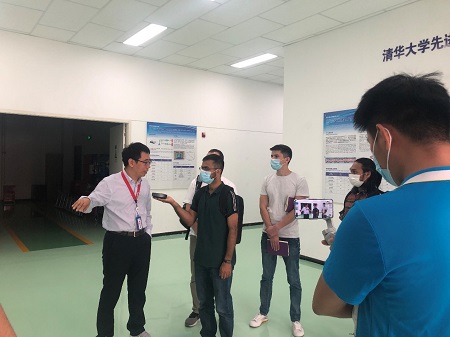
Professor Gao Zhe began by introducing the purpose and the importance of the internship and the activities planned for TUNEM 2019 students. He specifically pointed out that internships during the pandemic created many new challenges, but the online format will allow students to participate in various activities and learn about different information. Professor Gao hopes that both online and offline students can communicate with each other to overcome these difficulties and gain valuable experience from the internships. Later, Associate Professor Yu Jiyang gave a brief introduction about the visit and introduced the research performed by Professor Lu Wei. He hopes that every student can use the rest of the time to carefully tour and learn from the available exhibitions.
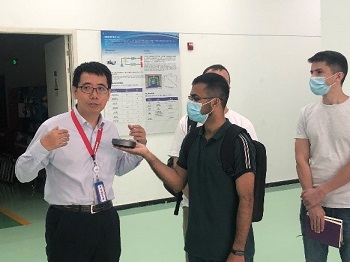
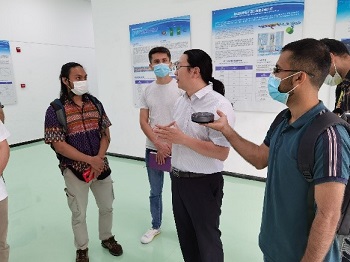
Professor Lu Wei, who graduated from Tsinghua University in 1998 and from UCLA with a PhD in 2006, and returned to Tsinghua University in 2011 to teach, is an internationally recognized leader in the field of laser plasma accelerators. His congenial and amicable personality immediately drew the students’ attention as well as respect. He introduced that there are two sets of accelerator systems in the lab, one conventional accelerator and one laser plasma accelerator, and emphasized such combination is unique in universities all over the world. He, then, led students around the inside of the laboratory where he showed and explained how the 3-meter-long conventional RF (radio frequency) accelerator works. He also explained the laser wake field acceleration (LWFA) phenomenon. Professor Lu stated that he and his team are currently working on the next generation compact light source.
Afterwards, Professor Lu invited all students to another Laser Room with two laser systems including one 800-nm ultrafast laser system (20TW, 600mJ, 30fs) for LWFA and other research and one 266-nm laser system (>1.5mJ, 100fs~10ps) for photocathode gun of conventional accelerator. To enter the room, everyone needs to put on a specific costume due to the dust-free requirement.
Professor Lu demonstrated the working principle of ultra-intense ultrafast laser system and explained why the development of intense laser technology has stagnated for almost 20 years since 1960s. Until 1990s, Chirped Pulse Amplification (CPA) technology, which was proposed in 1985, has promoted the development of intense laser technology as well as LWFA profoundly. It’s worth mentioning that CPA technology has won 2018 Nobel Prize in Physics.
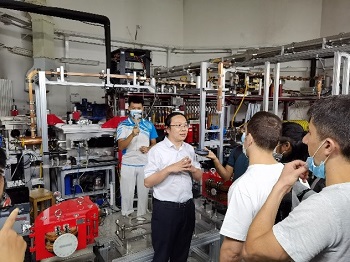
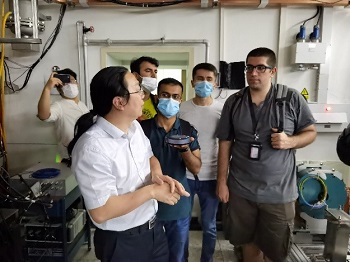
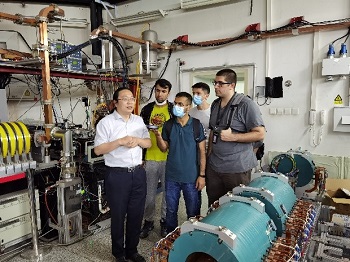
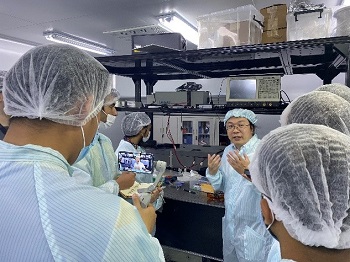
“One day, ultra-intense ultrafast laser system would be the same size asa simple small box on table top”, Professor Lu summed up. During this visit, the students gained a deeper understanding of the knowledge of nuclear technology that is relatively less exposed to them before, and thanked Professor Lu for his detailed explanation of the laboratory.
This visit is the second time that the TUNEM 2019 has conducted online and offline integrated practical activities since the pandemic. The teachers and students who are separated thousands of miles, summarized the previous experience, overcame many difficulties, and successfully completed this internship activity.

